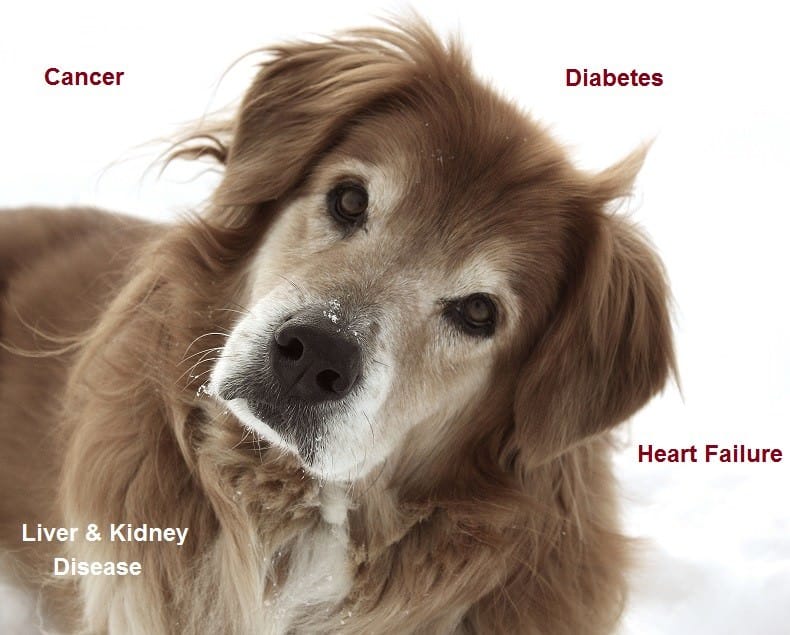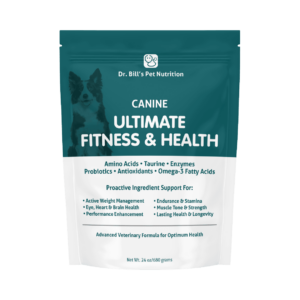By Dr. Bill Barnett, D.V.M.
Many complex and highly scientific theories have been put forth over the years describing how and why our animals get sick. Evidence indicates that in spite of the many medical advances we have today, the rate of disease in our companion animals continues to rise.
Here is a startling fact: very few animals ever die of old age. Most succumb prematurely to what is incorrectly termed “natural causes.” Why do you suppose a long and healthy life is almost never achieved within our pet population today? The answer is our pets are dying prematurely of chronic, degenerative diseases such as cancer, diabetes, kidney, liver & heart failure. What if we could lower our pet’s risk of contracting these degenerative diseases? Could we give them a chance at living a longer, healthier life?

Most dog and cat owners wish that their pets could live longer. Science dictates that health and longevity are directly related to three powerful forces – Genetics, Environment & Nutrition. Since this data represents both the mistakes and successes of the past, wouldn’t it be great if going forward we could eliminate the mistakes and improve upon the successes thereby enhancing both health and longevity?
Although genetics plays a role in aging and disease, nutrition is much more influential in that it helps regulate the powers of self-healing and cellular regeneration. Nutrition is said to be the very “foundation of life”. I like to say that optimum nutrition yields optimum results while inadequate nutrition usually leads to excessive cellular destruction and degenerative diseases that cause the acceleration of aging and premature death.
Health defense begins with a full range of vitamins, minerals, and other micro-nutrients. Pets do not manufacture vitamins; they must get them from either whole foods or supplements. Vitamins and minerals aid in antioxidant protection, help strengthen the immune system and support the body’s ability to naturally repair itself.
As pets age, they become increasingly depleted in nutrients that are capable of slowing tissue breakdown and handling tissue repair. Also, as animals mature their digestive systems slowly lose the ability to digest and absorb specific nutrients, thus adding to the problem. When you insert inadequate nutritional intake into the mix, you have all of the ingredients for accelerated physical aging and the early onset of degenerative diseases.
A significant fact to remember: today’s nutritional guidelines only provide for minimum maintenance levels of nutrition. It makes sense that optimum levels of nutrition would certainly benefit pets in terms of improved performance, vigor and lifespan. Over the past 100 years, pet food manufacturers have had the opportunity to improve upon their minimal guidelines. This leaves one to wonder why they have not.
Optimum Nutrition is the most important factor we know of when it comes to overall health & well-being
Prevention vs. Cure
Degenerative diseases do not appear overnight. They develop slowly, sometimes taking years before symptoms finally emerge. What this means is that most adult pets are, in fact, pre-ill. Their bodies are already developing the illnesses that may cause their premature death. This is why it is so important to think in terms of prevention rather than cure.
Through prevention, it is possible to slow, reverse or even stop the progression of these diseases before they become clinical. Preventive nutrition is a powerful tool in the arsenal of Health Defense.
Conventional pet care waits for something to go wrong and then attempts to treat disease with “magic bullet” drugs. These chemical compounds, with which a pet’s body is unfamiliar, carry a high risk of side effects. Preventive nutrition is pro-active. It uses substances that your pet’s body depends on. Preventive nutrition boosts an animal’s defense mechanisms and helps them deal with the cause of potential problems before they start.
Dr. Barnett’s Pet Health Tips
- Nutritional needs vary considerably between species. Cat food is not necessarily good for dogs even though it contains higher protein levels. Dog food should never be fed to cats.
- Nutritional needs vary during the different periods in an animal’s life. Be aware of the additional needs created by growth, pregnancy, lactation, stress, performance, work and aging.
- Internal parasites rob animals of needed nutrients leaving them susceptible to many different health problems. External parasites, like fleas, are highly stressful to an animal and can lead to numerous skin and coat conditions as well as anemia. Natural resistance to parasites is maximized when nutritional health is at its peak.
- The skin and coat can be one of the first indications of a nutritionally related problem. Excessive shedding, losing coat and the development of dry, flaky skin can all be easily reversed by assuring that optimum nutritional needs are consistently met on a day to day basis.
- Most of today’s pets are being overfed and yet they are undernourished from a nutrient standpoint. Reversing this trend is as simple as reducing consumption by 20 – 25% and providing a highly concentrated, completely balanced nutritional supplement to replace needed nutrients.
- Remember that high doses of any single nutrient can be just as dangerous as omitting a key nutrient from the diet. A balanced nutrient intake assures that all nutrients will work synergistically to support optimum health and well-being.
- When fed properly, any animal has the opportunity to be its best. Remember, it is always easier and much less costly to maintain an animal’s good health than regain it once it has been lost.
- Most pharmaceutical drugs contain serious side effects. When indicated they can be lifesaving, however, most of the health threats our pets face are often complicated degenerative diseases. The best defense for this is to support your pet’s own natural capacity to heal and regenerate itself through optimum nutrition.











0 Comments